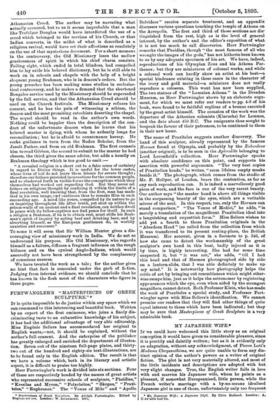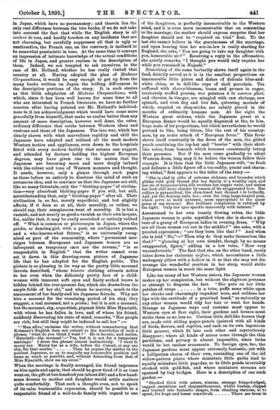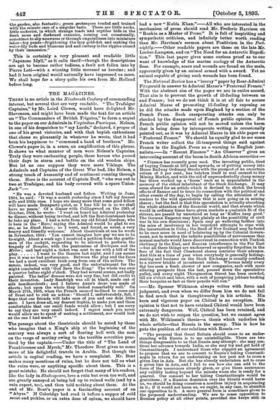MY JAPANESE WIFE.*
Jr we could have welcomed this little story as an original conception it would have given us considerable pleasure, since it is prettily and daintily written; but as it is evidently only an adaptation, without any acknowledgment, of Pierre Loti's Madame Chrysantheme, we are quite unable to form any dis- tinct opinion of the author's powers as a writer of original fiction. The plot is not very materially altered, and most of the little incidents and descriptions are adopted with but very slight changes. True, the English writer falls in love with and marries his Japanese wife, whom he paints as a pleasant, if somewhat Europeanised, little person, while the. French writer's marriage with a by-no-means idealised Japanese girl is one of those, unfortunately only too frequent.
• Mu Japanese Wife: a Japanese Idyll. By Olive Holland. London : A.. 0:nrable and Co. in Japan, which have no permanency ; and therein lies the only real difference between the two books, if we do not take into account the fact that while the English story is all couleur de rose, and hardly touches on any incidents that are not charming, but carefully suppresses all that is ugly or
unattractive, the French one, on the contrary, is inclined to be somewhat pessimistic in tone. At the same time it conveys an impression of intimate knowledge of the actual conditions of life in Japan, and greater realism in the description of them. Indeed, we are tempted to ask ourselves, in the ease of Mr. Holland, whether he has really visited that
country at all. Having adopted the plan of Madame Chrysantiame, it would be easy enough to get up from the many books written on Japan the trifling differences in the descriptive portions of the story. It is such stories as this little adaptation of Madame ChrysantUme, with which, since it has been well known for some time to all who are interested in French literature, we have no farther concern after having pointed out Mr. Holland's indebted-
ness to it (an acknowledgment which would have come more gracefully from himself), that make us realise better than any amount of mere description, however well done, the extra- ordinary difference that exists between Western ideas and
customs and those of the Japanese. The late war, which has clearly shown with what marvellous rapidity and skill the Japanese have adopted and utilised all the most modern Western tactics and appliances, even down to the hospitals
fitted with every modern facility that science can suggest, and attended by doctors holding the highest European degrees, may have given rise to the notion that the Japanese are becoming more and more deeply imbued with the colour and tone of Western manners and thought.
It needs, however, only a glance through such pages
as these before us entirely to disabuse the mind of such an erroneous idea, and to convince us that the Japanese are still, like so many Orientals, only the "blotting-paper "of civilisa- tion—very absorbent blotting-paper if you will, but still, notwithstanding that, only " blotting-paper " after all. Their civilisation is, so far, merely superficial, and but slightly affects, if it does so at all, their morality, or rather, we should say, their conspicuous want of morality. It is but a varnish, and not nearly so good a varnish as their own lacquer, for, unlike that, it may be easily scratched or entirely rubbed off. "What is common or picturesque in Japan, where the geisha, or dancing-girl, with a past, an ambiguous present,
and a who-knows-what future," is so universally recog- nised as part of the community, where "permanent mar- riages between Europeans and Japanese women are as infrequent as temporary ones are the reverse," "is so unspeakable in English" that the writer cannot even set it down in this drawing-room picture of Japanese life that he has adapted for the English public. The
picture is as pleasing in its way as the pretty little monsme therein described, "whose bizarre clothing attracts notice
to her even when the delicately pretty face of a child-
woman with innocent soft eyes and finely arched brows is hidden behind the ever-present fan, which she draws from the ample folds of her obi," and whom he marries, much to the amazement of her family and his Japanese friends. Why not hire a mousme for the remaining period of his stay, they suggest, a real monsme, not a geisha ; but it is not a mousme, but the mousme, shy, coquettish, piquant little Miss Hyacinth, with whom he has fallen in love, and of whom his friend, suddenly discovering his state of mind, remarks, "Her people are rich, but still they might be induced to sell her" "'Man alive,' exclaims the writer, without remembering that Kotmasu's English does not extend to the knowledge of such a phrase, what do you think I want ? ' He is laconic, and smiles, Hyacinth—the mousme.'—' Yes, but it is not for a temporary marriage.' I dress the phrase almost instinctively. I want to marry her. Marry her as a wife, before the Consul, or any one
else, for that matter.' Then he argues the matter in the politest Japanese, so as to magnify my honourable position and name as much as possible, and, without detracting from that of Miss Hyacinth, show me my error."
When the marriage is finally arranged, his friend impresses on him again and again, that should he grow tired of it as time went on, the gift of two hundred yen (about 240) and a few hand- some dresses to mother and daughter would settle matters quite comfortably. That such a thought even, not to speak of its calm businesslike expression, should be possible to a
respectable friend of a well-to-do family with regard to one of the daughters, is perfectly inconceivable to the Western mind, and it is even more inconceivable that on consenting to the marriage, the mother should express surprise that her daughter should not be "required on trial" first. To the last she cannot believe in the genuineness of the marriage,
and upon hearing that her son-in-law is really starting for England, she asks," You are going to take my daughter with you, honourable sir ? " Receiving a reply in the affirmative, she quietly remarks, "I thought you would only require her while you remained in Najaski,"
Something of the same barbarity shows itself again in the food, daintily served as it is in the smallest proportions on innumerable little plates and dishes of delicate blue-and-
white china, or in doll.like cups of shell porcelain. Tea suffused with sherry-blossom, beans and prunes in sugar, intricately stuffed prawns, wee potatoes it /a marron glace, and cherries in vinegar, are mingled with raw shrimps, raw
spinach, and even dog and live fish, quivering morsels of which, impaled on chop-sticks, are calmly placed in the mouths of ordinarily humane men. At the sight the Western guest sickens, while the Japanese guest at a European dinner would be equally disgusted at the, to him, huge scale of its proportions, but which nevertheless be would pretend to like, being bitten, like the rest of his country-
men, by an acute attack of "European fever." This fever shows itself constantly in the dress of the men, the gilded
youth combining the top-hat and " bowler " with their skirt- like robes, from beneath which trousers occasionally betray their presence. But if the men come gradually to adopt Western dress, long may it be before the women follow their example. It is thus that the little Japanese wife, "so fresh and delicate a little figure off a tea-caddy, quaint and charm- ing withal," first appears to the teller of the story :—
"She is clad in silks of extreme richness, and brocades which glitter with gold thread (for her family is a wealthy one), and her obi of turquoise-blue silk swathes her supple waist, and makes her look still more slender by reason of its exaggerated bow. Her coiffure is pyramidical, the ebon-hued hair dressed a la butterfly. And yet the fantasy suits her ; even the long large-headed pine, which serve as mock antennas, seem appropriate to the queer grace of my mousme. Her brilliant complexion is subdued by the light. Only her eyes sparkle innocently with interest."
Accustomed to her own loosely flowing robes, the little
Japanese woman is quite mystified when she is shown a pic- ture of a group of European ladies in evening dress. "Why are all these women cut out in the middle?" she asks, with a puzzled expression ; "are they born like that P" And when
she is told "No,"—" Then why do they make themselves like
that ?" "glancing at her own slender, though by no means exaggerated, figure," adding in a low voice, "How very uncomfortable." The fact that she, on the other hand, rarely takes down her elaborate coiffure, which necessitates a little mahogany pillow with a hollow in it so that she may not dis- arrange the wonderful erection in her sleep, would strike European women in much the same light.
Like too many of her Western sisters, the Japanese woman makes up her complexion, but without the slightest pretence or attempt to disguise the fact. "She puts on her little patches of rouge in a trice, puffs some white upon her cheeks and charmingly impudent nose, and reddens her lips with the certitude of a practised hand," as naturally as any other woman would tidy her hair or wash her hands.
Strange as Japanese ways and customs must appear to Western eyes at first sight, their gardens and houses must strike them as no less so. Curious little doll-like houses they are, made with sliding paper-panels (painted with all kinds of birds, flowers, and reptiles, and each on its own ingenious little groove), which fit into each other and mysteriously disappear ; where all kinds of noises come through the thin partitions, and privacy is almost impossible, since locks would be but useless ornaments. To foreign eyes, too, the Japanese gardens must appear extremely fantastic, yet with a Lilliputian charm of their own, reminding one of the old willow-pattern plates where miniature little paths lead to equally miniature little pagodas, or to little ponds invariably stocked with gold-fish, and where miniature streams are
spanned by tiny bridges. Here is a description of one such garden :— "Stocked thick with asters, zinnias, strange fringed-edged, ragged carnations and chrysanthemums, whilst bushes, clipped and trained into fantastic shapes, form climbing stations, so to speak, for huge and lesser convolvuli. There are trees in the garden, also fantastic ; green grotesques tended and trained with the minute care of a singular taste. There are little nooks, little rockeries, in which strange toads and reptiles hide in the fresh moss and darkened crannies, coming out occasionally, sometimes to slip unawares or through ungainliness into miniature lakes—toy ponds—frightening the lazy gold-fish and making the water-lily buds and blossoms nod and curtsey in the ripples caused by their immersion."
This is certainly a very pleasant and readable little 4' Japanese Idyll," as it calls itself—though the descriptions are apt to become rather tedious, a fault not fallen into by Pierre Loti—with a winning little mousme as heroine ; and had it been original would naturally have impressed us more. We shall hope for a story quite his own from Mr. Holland before long.








































 Previous page
Previous page